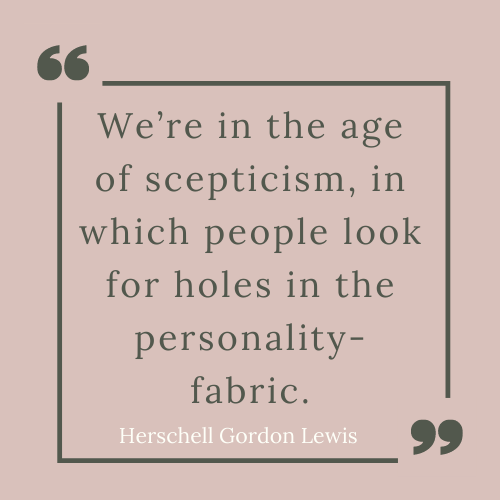Ponderous writing is lazy writing. Instead of digging beneath the true meaning of words, it's easier to combine abstract language with industry terminology. Herschell Gordon Lewis warns against developing this syndrome in his own inimitable way.
The full collection of the late great Herschell Gordon Lewis’ works is available in our free eBook: Killer Copy in a Crisis. Expect timeless advice sure to improve your marketing. But beware: it comes wrapped in barbs!
A few more modest proposals
Have I made this suggestion to you? Eschew obfuscation.
If you object to that suggestion, you’re dangerous on two separate levels:
First, you understood that pompous imperative.
Second, you don’t agree with the notion.
Every one of us is a creature crudely compounded of habits and prejudices. (I’m eliminating flesh, bones, and fat, because our sacred marketing domain is cerebral, not tissue-driven.)
Human targets
When our habits and prejudices match those of the human targets we’re trying to hit with words and pictures, the wonderful word ‘rapport’ rises out of the steam.
Ah, but when we take a patriarchal posture, we parallel failed artists who conclude smugly, as they starve: ‘The world is mad. I’m the only sane one.’
Suppress that vocabulary
The name of the aberration is Ponderous Writing Syndrome. (I can call it anything I like, and so can you, so feel free to re-title.) Pedants, who live in constant fear that their reliance on multisyllabic terminology is based on the one-string fiddle of expertise in a nondescript speciality, depend on Ponderous Writing (and for that matter, ponderous speaking) to protect their position within that narrow universe.
But no, no, not for us. We’re communicators.
Like or impress
 One of our communicative weapons is vocabulary suppression.
One of our communicative weapons is vocabulary suppression.
Our charge is establishment of rapport, and test after test – even with targets whose own affiliation is within the self-proclaimed sacred territories of education and medicine – tells us ‘Look how super-literate I am’ text or speech diminishes response instead of enhancing response.
A simple litmus test: Pretend you’re at a dinner party, sitting next to someone you want to like you.
Note the difference between someone you want to like you and someone you want to impress. The difference is the difference between equivalence and superiority.
In the antediluvian period (long ago, ending with the death of dinosaurs and naïveté around 1980), people flocked to the feet of those who claimed superiority . . . because there seemed to be the possibility of an indescribable cachet. No more.
We’re in the age of scepticism, in which people look for holes in the personality-fabric.
Notice anything? In the previous paragraph I used the word antediluvian. It’s a perfectly sound Anglo-Saxon word, technically meaning ‘before the flood’. If you noticed it, understood it, and shrugged in mild disgust at what you regard as a pomposity, you understand the difference between a perfectly sound word and a sales-worthy word.
Negatively, not positively
In a retail situation, a vendor who tries to impress you with technical terms or verbosity impresses you negatively rather than positively. Verbal terminology and written terminology are of a piece today, thanks or no thanks to the World Wide Web, which has superimposed verbalisms on written communications.
So, writing marketing text larded with big, overblown, obfuscatory words is as easy as a visit to Roget’s or right-clicking ‘synonym’ in your word processing program.
Using convivial, rapport-inducing words is as easy as pretending you’re talking as you stroll or sharing a pinot noir.
Cheers!
Want to more straightforward marketing perspectives? Sign up to our newsletter.






Leave your thoughts